If Gaddafi Stays In Power, Then What’s The Point Of Intervention?
U.S. officials are making clear that the current mission in Libya may not lead to the end of Muammar Gaddafi's rule. If that's the case, then why are we there in the first place?
This morning, the Chairman of the Joint Chiefs of Staff made clear something that was only implied yesterday; that the current mission in Libya does not necessary mean an end to the rule of Muammar Gaddafi:
The chairman of the Joint Chiefs of Staff went on Sunday interview shows today to echo the Obama administration’s position that the U.S. is working with allies on military action in Libya that is defined and limited — and could conceivably leave Moammar Gadhafi in power.
“That’s certainly one potential outcome,” Mullen said on NBC’s Meet The Press, stressing that the mission is designed to enforce a United Nations resolution demanding that Gadhafi stop attacking Libyan citizens who oppose his government.
On ABC’s This Week, Mullen said that “the military objective” of the mission is to “focus on getting this no-fly zone in place and to support the U.N. objectives of no humanitarian crisis and humanitarian support, protecting Libyan civilians.”
Mullen’s comments emphasize something that’s become clear in the hours since military action began. Namely, that western leaders are being very circumspect in defining the goals of this intervention:
Allied leaders so far haven’t provided defining answers; in fact, quite the contrary. In a series of comments and communiques over the weekend, American, British, and French officials stressed that they aren’t attacking Qadhafi’s forces to achieve “regime change” – while at the same time maintaining, as British Prime Minister David Cameron insisted, that Qadhafi “needs to go.”
President Barack Obama’s remarks Saturday seemed carefully calibrated.
“I am deeply aware of the risks of any military action, no matter what limits we place on it,” he said. “But we cannot stand idly by when a tyrant tells his people that there will be no mercy, and his forces step up their assaults on cities like Benghazi and Misurata, where innocent men and women face brutality and death at the hands of their own government.”
Analysts said the overwhelming military superiority enjoyed by allied forces makes Qadhafi’s ouster reasonably likely, but they also voiced concern about the Libyan leader’s proven ability to hang on.
“There are expectations about how quickly this moves that are out of line with reality,” said Heather Hurlburt, who heads the National Security Network, a group allied with the White House, and who said she expects that “this is going to be more like Kosovo than like Baghdad in 2003.”
National Security Advisor Tom Donilon has had his staff review the history of American intervention in civil conflicts, and while American’s memory of the Balkans may be hazy, the White House is full of Democrats with painful recollections of the excruciating months of bombing, and then the year between the end of Serbian strongman Slobodan Milosevic’s massacres and the moment his domestic rivals finally forced him aside.
(…)
What the Western powers and other Arab leaders hope for is clear: A show of force, followed by a swift collapse in Qadhafi’s inner circle.
“The best case scenario [is that] you see the forces loyal to Qadhafi continue to abandon him and eventually give him up,” said Stephen McInerney, the executive director of the Project on Middle East Democracy in Washington.
And analysts said that best-case outcome could still be in the cards. Other Middle Eastern regimes have proven shockingly brittle in the “Arab Spring,” with military leaders in Egypt and Tunisia abruptly turning away from their longtime dictators. But Libya’s inner leadership, far more than those regimes, has been a black box to its Western enemies, and who could lead a coup against Qadhafi remains unclear.
“Nobody believes – at least among the people who planned it – that it’s going to be a prolonged affair,” said Aaron David Miller, a former State Department official now at the Woodrow Wilson Center in Washington. “They intend shock and awe in an effort to strike so persistently and in such a sustained fashion that the regime cracks.”
As Dave Schuler pointed out yesterday, Resolution 1973 is strictly limited to the protection of Libya civilians, and President Obama, Secretary of State Clinton, and now Admiral Mullen have made clear that the regime change in Libya is not part of the mission we are engaging in. Conceivably then, that could lead to a situation in the coming weeks and months where pro-Gaddafi forces have effectively withdrawn from the areas under the control of the rebels, the allies control the skies, but the status quo on the ground remains unchanged. Among other things, that would mean that Gaddafi would have physical control of the vast majority of Libya’s oil reserves while the rebels would control a rump territory in the western part of Libya. Conceivably, then, Gaddafi and his cronies could survive. Sure, they’d be international pariahs, but Gaddafi has spent the better part of his 40 years in power as an international pariah so I doubt he’d mind that.In the meantime, the International community would continue to be responsible for the safety of Libyan civilians.
If that’s what this accomplishes, then one has to wonder what the point of this intervention is.
Of course, there are two points worth noting here.
First, the fact that the UN resolution was limited in its scope to the protection of civilians indicates fairly starkly that there was not sufficient support for a stronger resolution that would have authorized action to aid the rebels, or to bring about the downfall of the Gaddafi government. So far, the French are the only ones to recognize the rebels as the “legitimate rulers” of the Libyan people and they obviously were not about to convince anyone else on the Security Council to take a stronger position.
Second, there are as many possible downsides to removing Gaddafi from power as there are to keeping him there. We have no idea who these rebels really are, we have no idea if we can trust them, and we have no idea what the political future of Libya post-Gaddafi will be. Getting involved in that situation is as foolish as it has been to get involved in the political transition in Afghanistan. As tempting as it is to say that the world will be better of without Gaddafi, Colin Powell’s Pottery Barn Rule tells us to be careful about intervening in the internal politics of nations we have no real understanding of.
We’re left, then, with a worst of all possible worlds scenario no matter which way things turn out. Which is why we shouldn’t have gotten involved to begin with
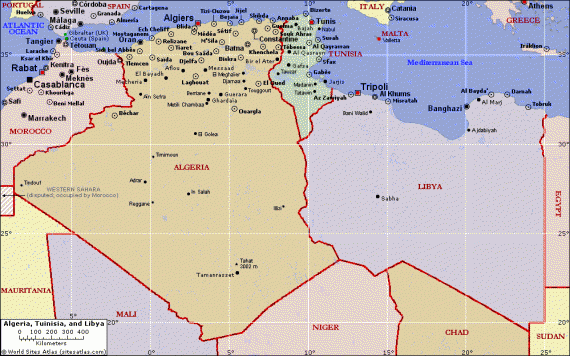

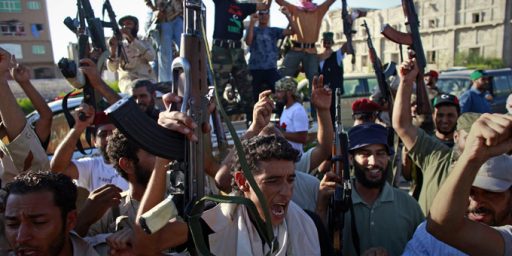
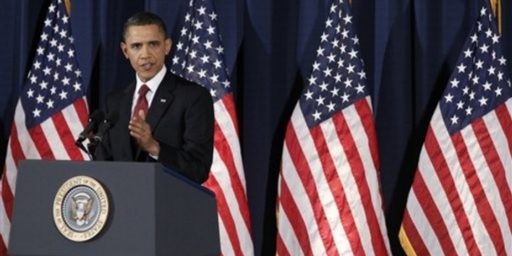
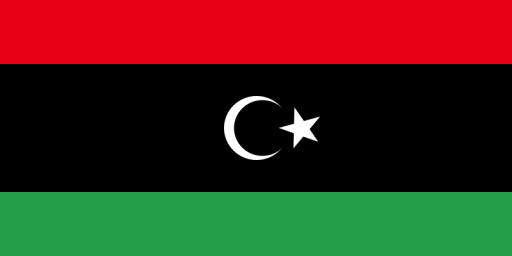
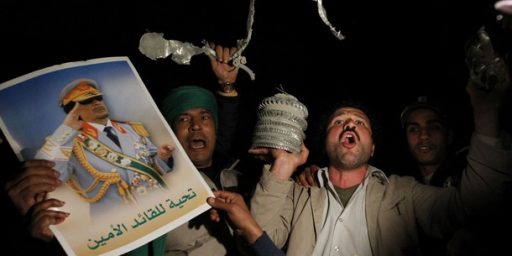
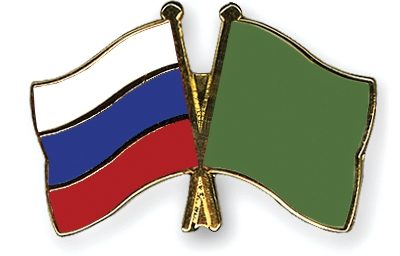
For me the bitter irony of this intervention is that as far as I can tell those who support the president’s actions do so under the assumption either that he’s lying or mistaken and that regime change in Libya (which the president has previously supported although not in the context of this intervention) is the objective. They’re banking on mission creep.
If the Europeans are not simply insane, they must calculate that they are better off with a weakened Gadaffi.
BTW, in corporate competitions and international relations, never discount personal animosities.
Stephen McInerney: “The best case scenario…”
…is that Libya becomes a net exporter of unicorns and rainbows. We know. Tell us what the WORST case scenarios are.
@Mataconis: “…while the rebels would control a rump territory in the western part of Libya.”
That should be the eastern part, shouldn’t it?
Maybe the point of the intervention was to prevent Qaddafi’s intended murder of all those he thought opposed his brutal rule.